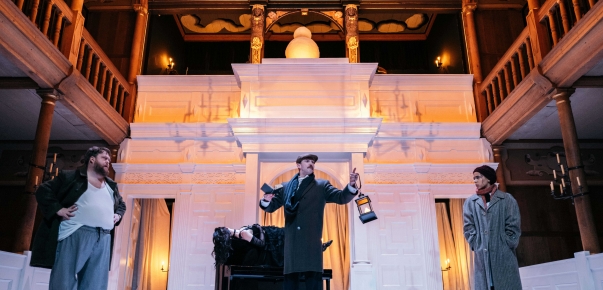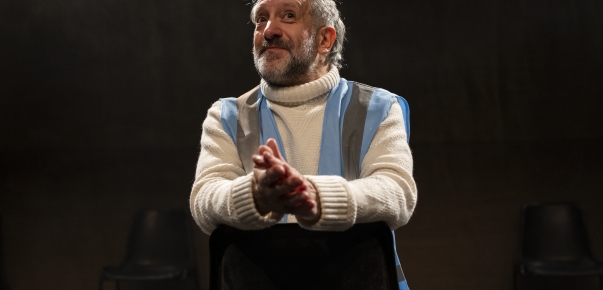Meet the Neuropyschologist behind our Pioneering Research Project
1 Feb 2023
If you’ve seen Drive Your Plow Over the Bones of the Dead in our theatre you might have seen a few audience members walking round with swanky wristbands on. But these aren’t just any old fit bit. They are data-catching wristbands for a pioneering research we're doing in partnership with University of Bristol, University of West of England, University of Bath and Bath Spa University as part of the MyWorld Project. Now for the science part..
Iain Gilchrist, is a Professor of Neuropsychology at the University of Bristol and leading on the project. He has spent the last 5 years looking at what happens to people when they are immersed in a creative experience. He's part of a group of researchers from four of the West of England's major universities finding out what happens to people in a theatrical experience, alongside Bristol Old Vic - (we're doing the theatre bit).
What is it about the magic of theatre that makes our hearts race, and do we all react to the same moment in a scene in the same way?
This interview has been republished with permission from Bristol Life.
What exactly does a Neuropsychologist do?
A Neuropsychologist is a scientist who tries to understand how the activity in the brain creates our mental lives, and by mental lives I mean our senses, perception, memory, emotions etc.
How did you get into this specific area of research, and what fascinates you most about it?
That previous answer may sound a bit dry but just think about it for a moment. Everything in your mind - the colour of the sunset, the memory of your first day at secondary school, the fear from a horror movie - is all from your brain: a slightly wobbly physical thing which weighs not much more than a bag of sugar. How is that even possible? And how can that not be fascinating!
How long have you been working in this area?
I’ve been working on the relationship between the brain and the mind for 30 years. For the last 5 years a major focus of my work has been understanding audiences. This more recent work is a collaboration with a team at Bath University lead by Professor Danae Stanton Fraser.
What is it about audience behaviour that you find so intriguing?
Humans are very easily distracted. Give us a slightly boring, tedious job and we can hardly stick at it for 5 minutes. However, when people sit down to watch a play, TV or film then we get completely immersed - we don’t notice that time has passed; don’t hear phone notifications; and even forget to eat or drink. So the question is, what is happening to people’s brains when we become immersed and how and why does that happen.
You’re involved with the Bristol and Bath MyWorld project – what is that?
The Bristol and Bath region is a thriving hub for the creative industries. To grow the sector, the UK Government has made a major investment in our region in research and development, new state-of the-art facilities, training, and business support. This program of investment is called MyWorld. The program brings together Universities in the region with companies and arts organisation to innovate and explore new approaches and technologies.
Can you tell us a bit about the project you’re running with Bristol Old Vic?
We want to understand in more detail how audiences respond to a live theatre performance. So, we will be asking members of the audience to wear a recording wristband while they watch the production Drive Your Plow Over the Bones of the Dead. This will allow us to monitor moment-by-moment heart rate, skin conductance and fidgeting. Bristol Old Vic are also live-streaming the production and we will use the same technology to monitor people watching the live-stream.
What are you hoping to discover?
One important question is how the live-stream experience differs from the live experience in the theatre. This information might help us discover how we can film the production differently to try and at least partially recreate the live experience.
Why did you choose this production as the vehicle for the research?
Quite simply it’s an amazing play being produced by Complicité, one of the best, and most innovative theatre companies in the country. Anyone who has read the book will also know that it’s a story full of suspense, surprise and emotion.
Who are you observing? Have you chosen any specific people for this?
We’re recruiting randomly from anyone who has brought a ticket. So if you have a ticket, you may have seen an email inviting you to take part in our study.
How could this sort of research help in the long run? (We’d just be happy if you can you recommend anything sciency that would stop people unwrapping boiled sweets?)
Theatre audiences used to be noisy - if they didn’t like a show they would boo and throw cabbages. At some point we were told to sit still, in the dark, in silence. We hope that the methods we are developing with once again allow us to know how the audience are responding to a performance moment-by-moment without having to reintroduce the cabbage as feedback!
Apart from neuropsychology, do you have any secret skills?
I do like to cook – I always have done, but the Gloucester Road and it’s independent food (and wine) shops are a constant inspiration. Maybe my Gingerbread Cabot Tower was a high point? Instagram: @cookingnotbrainscience



